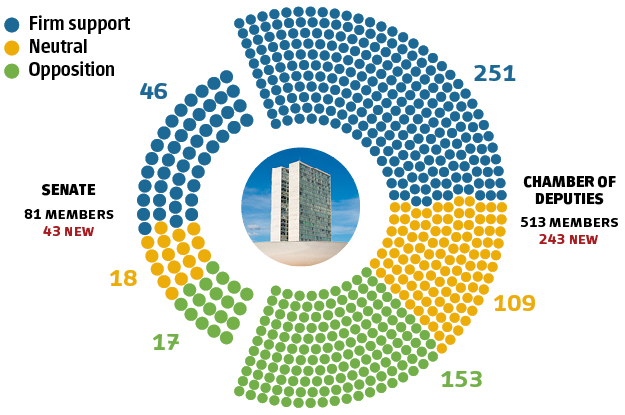This article was adapted from our latest print issue. To see the rest of our package on Brazilian politics, click here | Ler em português
As a candidate, Jair Bolsonaro promised sweeping changes for Brazil. Below, AQ looks at what he wants to accomplish – and why he’ll likely get his way. Note: “Odds of implementation” refers to the chances that a given policy will be implemented, not whether it will achieve its intended outcome.

“Unleashing” Agribusiness
During the campaign, Bolsonaro’s attacks on environmental agencies and NGOs made him a hero for the more radical ruralistas, as the powerful agricultural congressional caucus is known. He promised to make it easier to farm land in Brazil, even if that meant, for example, stripping indigenous Brazilians of protected territory or drastically reducing controls on deforestation. Bolsonaro’s choice for agriculture minister, Tereza Cristina, was the president of the caucus before his election and is directly associated with the more extreme forces within the group. She has doubled down on her new boss’ promise to end fines on environmental violations.
Odds of implementation: High
Bolsonaro will need the ruralistas’ votes in Congress to advance other elements of his agenda, and the caucus became even more powerful following the 2018 legislative elections.
 War on Criminality
War on Criminality
Though police kill 5,000 Brazilians a year, Bolsonaro has been clear his approach to Brazil’s record high violence will be an outright siege on criminals with police receiving carte blanche to kill. His allies in Congress will push to reform existing legislation to expand access to guns and to try teens as adults.
Odds of implementation: High
Public exasperation over crime may be Bolsonaro’s biggest well of support, but Congress’ rightward shift in 2018 also creates a favorable environment in Brasília for this agenda. Yet his hardline approach will likely increase violence, with painful human costs.
 Pension Reform
Pension Reform
Brazil’s pension system is a ticking time bomb and, if not deeply reformed, will blow the country’s budget in a not-so-distant future. Average retirement age is below 60, certain groups enjoy lavish privileges and Brazil’s population is aging. Without a comprehensive reform on the horizon in the first months of the new administration, doubts about Brazilian solvency will increase, with a potential domino effect on other reforms on Finance Minister Paulo Guedes’ agenda.
Odds of implementation: High
Given the strong pressure from markets and the incoming economic team, Congress will likely pass some form of pension reform. Yet the more important question is whether the change will be deep enough. Bolsonaro has spoken about passing several bills, instead of a constitutional amendment (which requires a supermajority in Congress). However, using ordinary laws to address key points, such as establishing a new minimum retirement age and reviewing so-called acquired rights, will likely lead to protracted judicial battles and more uncertainty.
 Anti-Corruption Reforms
Anti-Corruption Reforms
Bolsonaro has promised Justice Minister Sérgio Moro “total freedom” to design and enact anti-corruption reforms. While traveling to meet with the president-elect for the first time, Moro was photographed holding Transparency International’s recommendations for enforcement and transparency. Yet the nature and extent of his reform agenda was still mostly unknown as this issue went to press.
Odds of implementation: Medium
Given Moro’s reputation, legislators will have a hard time publicly rejecting Moro-sponsored bills on corruption. But some factors may well derail broad anti-corruption reforms in Congress. Moro has no experience as a policymaker or negotiating in Brasília. Also, his proposals will compete with other priorities in Congress for Bolsonaro and his allies — from pension reform and security to “moral” issues.
 Overhauling Education
Overhauling Education
Schools are likely to be ground zero for the crusade of social conservatism expected from Bolsonaro and his allies. A critic of affirmative action, the president has also spoken about combatting “Marxism” in schools. His education minister, Ricardo Vélez Rodríguez, supports the School without Party movement, which seeks to pass legislation “cleansing classrooms from leftist indoctrination,” including conversations about gender and sexuality. Vélez and Bolsonaro have also promised to remove “ideological content” from ENEM, Brazil’s federal scholastic test. How they will translate this ideological cleansing into actual policy is uncertain.
Odds of implementation: High
Bolsonaro’s allies will not have serious problems passing broad legislation in Congress on “moral” and “ideological” issues of education. Yet the government will have limited administrative powers, as Brazil’s public education from daycare to high school is almost entirely under municipal and state authorities.
Bolsonaro’s Support in Congress
Brazilians elected a raft of new legislators in October 2018. Below, a breakdown of the support Bolsonaro commands in Congress, with the caveat that allegiances may – and likely will – shift.

O’Boyle is a senior editor at AQ. Reporting on Congress by Ximena Enríquez.









